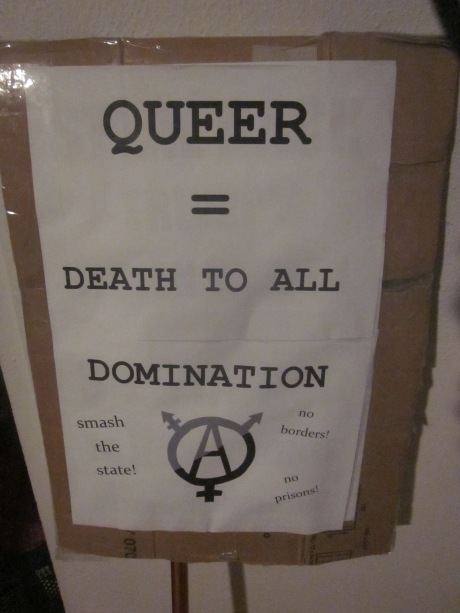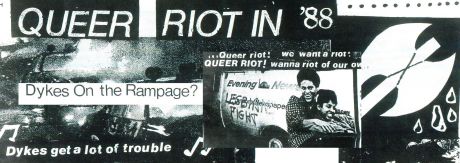Lonely Robots: Transhumanist Responses to Unfuckability July 4, 2017
Posted by Summerspeaker in Feminism, Queer politics, Science Fiction, Technology, Transhumanism.Tags: desire, future, queer, romance, sex
add a comment
Soon after I mentioned being genderqueer during a conversation at the Extreme Futurist Festival 2011, the person I was talking to responded, “Wow, it must be hard for you to find sexual partners!”
“Gee, thanks,” I thought. As tactless as that remark may have been, it wasn’t wrong. This piece by Meredith Talusan explores some of the dynamics involved. Unfortunately, complaining about not getting laid immediately calls to mind masculine sexual entitlement to women’s bodies. I’m not sure it can escape that established trope.
The question of who’s considered attractive and who receives affection matters, but it’s unclear what to do. Most successful folks on the left and elsewhere enjoy their social power and/or romantic/sexual attractiveness. Critiques of the status quo as making it difficult for some to realize their desires potentially unsettle the existing elite, so they’ve no interest in pushing such critiques.
It’s telling Talusan’s article centers the achievement of Jacob Tobia and Alok Vaid-Menon, taking for granted the notion that prominent folks should get dates. What about all the humans who conform to neither ideals of attractiveness nor of success?
Well, nobody cares about those losers!

Anybody who values the overall good should care, though, and some do, or at least pretend to. Transhumanism offers various theoretical easy fixes to the problems of loneliness and unfuckability, albeit with severe implementation issues and philosophical implications.
Wait, some people are poor, ugly, crazy, and/or sick? Let’s use technology to get them up to standard. We can all be sexy immortal billionaires!
A lot of transhumanists think this way.
As simplistic as this perspective is seems, the difficulty if not impossibility of conforming to existing norms indeed accounts for much of their oppressive power. Currently, the genetic lottery, money, and time determine who’s beautiful, hot, sexy, stunning, etc. If anybody could make their body match ideals of physical beauty, the advantage the genetic elite have in this regard would evaporate.
On the other hand, the normatively gorgeous don’t necessarily have the kind of sexual and romantic relationships they want, so opening access to beauty hardly seems sufficient. Additionally, what about folks who chose unpopular aesthetics? They might still find themselves undesirable despite full morphological freedom. Additionally, deprived of the genetic hierarchy, attractiveness norms could shift to become akin to fashion: “Girl, that body is so last month!”
The prospect of modifying minds quickly leads to questioning the basis of individual identity. For example, assuming I could make myself think and behave as popular and successful people do, would I want to? What about rewiring my mind to disregard social status and affection entirely? Would I still be me if I did either of those? I don’t know. Many of us stubbornly wish to remain who we imagine ourselves to be.
Matching Algorithms
Given the wide array of different desires folks have, morphological freedom by itself seems inadequate for solving the problem of loneliness and unfuckability. And of course full morphological freedom would require technological innovation and economic transformation; it’s a long way off.
However, there’s potential to make things dramatically better in the nearer term. Matching algorithms, such as featured on dating sites like OkCupid, can facilitate connections and enable romantic/sexual relationships. This ain’t necessarily that great at the moment, but the principle of aligning people’s desires, interests, etc. has promise. As big the world is, there’s probably at least a few folks somewhere whose desires match up with any given person’s at any given time.
For instance, let’s say I want to get tied up right now. I don’t know anyone who I think would be interested, but there’s a decent chance one or more of the planet’s seven and half billion humans is, especially if they had an idea of who I am and a basic level of trust. There might even be somebody my city or neighborhood.
Increasingly sophisticated digital networks can theoretically hook people up for both romantic/sexual relationships and other interactions, decreasing loneliness and improving quality of life. We already try to do this with our social media, though it’s a rather blunt instrument at present.
Certain transhumanists and others look optimistically to sexbots, predicting physical and mental health benefits. Yet, in addition to raising questions about objectification, sexbots are unlikely be able to convey the social status associated with romantic/sexual desirability. While some may eventually function as romantic partners, this wouldn’t be equivalent to human partnership unless they had human-level or above artificial intelligence and autonomy like a human. Sexbots might well alleviate the pain of unfuckability by human standards, but it’s unlikely they would completely resolve the problem. As Sherry Turkle and company argue, the prospect of sex and love with robots has the potential pitfalls. I find those concerns mostly misguided but relevant here.
Virtual Reality
Virtual reality offers a number of benefits for sexual/romantic relations, whether between humans or between humans and AIs. VR makes change ones appearance trivial, eliminating that aspect of the genetic lottery. By transcending geographic limitations, VR in conjunction with matching algorithms could dramatically increase the odds of meaningful connections.
VR sexbots have the same issues as physical ones, albeit with perhaps less stigma. With or without sexual/romantic elements, VR worlds could simulate social status, as games do today. Losing oneself in VR entails similar philosophical challenges to transforming one’s psyche as described above.
Conclusion
None of the above technologies can replace the political and social project of creating a more accessible and fulfilling society, but they can assist in that project and make life more livable in any case.
Pride’s Queer Future June 27, 2017
Posted by Summerspeaker in Anarchism, Anti-imperialism, Feminism, Queer politics, Science Fiction, Transhumanism.Tags: future, Pride, queer, SJW, Zionism
add a comment
The year is 2020.
Pride events across the United States have banned cops, corporations, Zionism, & U.S. nationalism.
Talking heads rail about intersectionality as masked queers loot banks and big-box stores.
Cishet white men approach with caution, assuming the SJW mob will rip them apart. Instead they find themselves caught up in the revolutionary fervor.
Semi-autonomous remote-controlled drones assault police cars and stations massive numbers.
Law and order breaks down. It’s chaos in the streets.
New worlds are forming.
Homonationalism Means Bashing Queers June 9, 2016
Posted by Summerspeaker in Anarchism, Anti-imperialism, Decolonization, Feminism, Queer politics, Transhumanism.Tags: Albuquerque, Albuquerque Pride, anarchism, homonationalism, LGBT, queer
4 comments
I just got back from Albuquerque’s Trans March to the Pride Candlelight Vigil. As I yelled “Death to the United States!” and “Death to imperialism!” during the U.S. Pledge of Allegiance and National Anthem, two homonationalists put their hands on me, threatened to beat me up, grabbed my sign, and temporarily pulled it off its handle. This neatly illustrates what inclusion entails for normative LGBT subjects: bashing queers.

Earlier, during the Trans March, I engaged violent insurrectionist propaganda of the deed by following the lead of a few other folks and walking into the lane of traffic we were supposed to leave open. Security, safety, or whatever-the-hell people in reflective vests told me to know my place and get back in line. At first I ignored them. At a stop, when I don’t believe I was actually even blocking traffic, my presence out of the assigned area created a scene. One reflective person put their hands on me. Others endeavored to persuade me to conform. They said I was risking arrest. Somebody in the crowd said I needed to be peaceful.
“Death to peace!” I shouted. “There is no peace!”
When the march began moving again, I joined the main flow but on the outer edge, partially in the forbidden zone. When a person who identifies as an anarchist came to whip me into shape, I lost it and rushed through the crowd to the sidewalk. I the left the march at that point, as far I was concerned. I followed along as a bystander or perhaps heckler, not as a participant.
The security folks were doing what they thought was right, I’m sure. While I intentionally pushed the envelope, I suspect I would have gone with crowd after that pause if the peace police had simply let me stand there instead giving me a hard time.
Some attempts at control prove counterproductive.
Taking the whole street would have been safer and more fun. It’s fully appropriate, given the importance of trans lives and trans visibility.
Because of this debacle, I arrived at the vigil already enraged. The event announcer, Tony Carson, told us to get patriotic. “Death to patriotism!” I responded. Carson said something about taking that Saudi Arabia. I continued yelling through the ensuing U.S. nationalist ceremonies. I wasn’t in any mood to hold back.
Carson was the first homonationalist to confront me. Ey demanded that I leave, threatened to hurt me, and got up in my personal space. I alternated between yelling anti-U.S. slogans for everyone to hear and arguing with em. Ey grabbed my sign and we struggled over it. Another homonationalist came up and said ey would knock me out. Ey identified as a veteran. I said was condemning the United States as a political entity, not the individuals in the military. This second homonationalist also grabbed my sign, albeit with less vigor than the first.
A prominent LGBTQ organizer intervened with a liberal narrative of tolerance and free speech. The homonationalists had assaulted me and threatened me with bodily harm, but whatever. We’re all equal; it’s all good. Homonationalists who immediately turn to threats and physical attacks are the same as loud but technically peaceful queer anarchists as far as the big-tent LGBTQ movement is concerned, right? We just need to learn to get along. What’s a little domination, hierarchy, and oppression between family?
Nah, y’all ain’t my family.
Eventually a few folks with (un)Occupy Albuquerque approached and engaged. It felt like they had my back in the moment.
Although the homonationalists didn’t deliver the bashing they talked about, their repeated threats and physical aggression show how homonationalism functions. Becoming a respectable LGBT subject means disavowing radical queers who pose a danger to the nation. It means bashing those radical queers if they criticize the nation and won’t shut up.
After all, violence against the enemy and against the traitor is what nationalism is all about. It’s not surprising that these folks want to hurt me for insulting the United States, but it does tell you everything you need to know about the mainstream LGBT movement.
Homonationalists are another group of queer bashers. Their norms ain’t quite the same as your stereotypical straight homophobic man’s are, but they enforce them in the same fashion.
Albuquerque Pride condones and enables homonationalist queer bashing.
Queer anarchists struggle against all such policing. I wish had a queer transhumanist anarchist crew. (Ideally, each of these identifications implies the other two.) However, this is Albuquerque. Furthermore, queer transhumanist anarchist values hardly lend themselves to community.

While I respect certain oppositional nationalisms under present conditions, I consider U.S. nationalism utterly pernicious. Emma Goldman’s analysis of nationalism from the early twentieth century remains essentially correct. Nationalism and militarism stand in direct conflict with the core principles of freedom and justice, as well as with those of innovation, science, and technology. Sure, nationalism and militarism fuel technoscientific development at times, but much of this is wasted effort. Ultimately, free flow of information and of people does the most to advance science and technology, to make transhumanist dreams reality. Borders, militaries, and governments cause vast human suffering and hinder progress.
Death to the United States!


